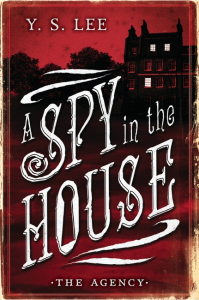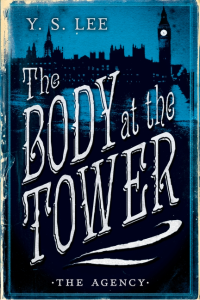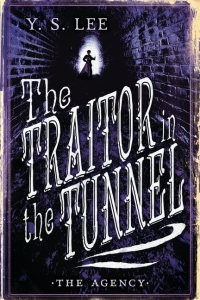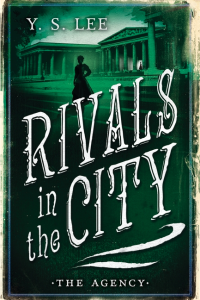Y.S. Lee's Blog, page 3
August 24, 2016
Giveaway time!
Hello, friends. It’s time for an end-of-summer giveaway! We have a prize pack of 16 books up for grabs, including the first Agency novel, A Spy in the House. Ready to play?

The DASH rules
Visit all fourteen participating authors and tally the answers to the featured question. This means you need to count how many authors chose A, B, C, D, E, or F as their answer to the featured question. The most popular answer will unlock the rafflecopter and enter participants into the draw. Only those who enter the correct answer will be eligible for the draw. The rafflecopter is here: https://theyadash.wordpress.com/
The featured question
What’s your favorite way to kill a character?
A. Gun
B. Poison
C. Buried Alive
D. Drowned
E. Strangled
F. Fire
I spent longer than I should have weighing these options! I still don’t have a strong preference but the setting for my detective series, the Agency, is Victorian London and poison might be the ultimate Victorian murder weapon. For the purposes of the Dash, I choose B. Poison.

For an extra contest entry, sign up for my newsletter either by clicking here or scrolling to the bottom of the page for the permanent sign-up form.
You can also read free excerpts from all four Agency novels on my website: A Spy in the House, The Body at the Tower, The Traitor in the Tunnel, and Rivals in the City.
The YA Dash giveaway runs from August 25 to August 29. Click here for the next stop on the blog hop, author Laurie Stolarz. Thanks for playing, and best of luck!
August 23, 2016
It’s almost time
Hi, friends. Tomorrow marks the start of the YA Dash, a giveaway featuring a prize pack of 16 books (including A Spy in the House). The contest runs from August 25 to August 29.

(But the YA Dash isn’t one of those times.) I hope you’ll come back tomorrow to play!
August 16, 2016
The old man is snoring
Hello, friends. IT’S RAINING! This summer, Kingston is experiencing its most severe drought since 1888, and I am so grateful to see the recent rains.

Yesterday, a series of coincidences led us to the lakeside cottage of a friend-of-a-friend. It was incredibly beautiful to drink wine, eat gazpacho, and watch the kids swim (briefly!) in a cold, grey lake.
Here’s the view from the dock:

And another:

The following poem is a favourite with my children right now. This month, we’re calling it “August Rain Song” but it’s actually:
April Rain Song, by Langston Hughes
Let the rain kiss you
Let the rain beat upon your head with silver liquid drops
Let the rain sing you a lullaby
The rain makes still pools on the sidewalk
The rain makes running pools in the gutter
The rain plays a little sleep song on our roof at night
And I love the rain.
Hope you have a lovely week, and that you get restorative doses of sunshine, rain, or whatever you need most!
August 9, 2016
On historicity
Hello, friends. I’m at a critical point in Monsoon Season – about 70% through a first draft – and things are starting to come together fast. I’m at that amazing, terrifying, highly adrenalized point at which I start to think about the novel ALL THE TIME. Even when I shouldn’t be. And I still don’t know how it’s going to end.
One of things I’ve been turning over in my head is, Am I willing to take significant liberties with history? Here’s the situation: a series of events occurred in January 1947 that are important to my novel. There is a second, separate series of events that occurred in May/June 1946 that would make a delightful backdrop. The events of January ’47 are central to the plot. The events of May/June are under-reported and quite astonishing in themselves. But I can’t fit them both in without merging the timeline – that is, without transplanting the events of January ’47 to May/June ’46. That’s a big, bold compression of time.
With the Agency novels, I began with an ahistorical premise in order to create Mary Quinn’s world. But once things were in place, I stayed true to historical events. I haven’t quite decided what I’m going to do here. I’m very tempted to crunch the timeline in order to wedge my set-piece into the novel. It would be astoundingly good fun. But would that undermine the rest of the novel’s historicity? It’s an especially critical question because this novel is about history, the limitations of history, and the silencing of some histories.
There are other scenes I can write while this simmers at the back of my brain, so I’m going to keep turning this over for a little while. Right now, I’m leaning away from including the set-piece because it seems more like self-indulgence and convenience than anything else. But we’ll see.
What are you up to, this week? Any there burning writerly philosophical questions haunting you?
August 2, 2016
Knight vs snail
This week, my friend A.P. steered me towards one of the most absurdly delightful things I’ve seen in a long time: illuminated medieval manuscripts featuring knights doing battle with snails. Yes, literal snails. Flying snails, no less.
 Image from the Queen Mary Psalter, England, 1310-1320, Royal MS 2 B VII, f. 148r (via the British Library’s Medieval Manuscripts blog). Oddly enough, there’s no mention of the knight’s winged dragon half, or how often that crops up.
Image from the Queen Mary Psalter, England, 1310-1320, Royal MS 2 B VII, f. 148r (via the British Library’s Medieval Manuscripts blog). Oddly enough, there’s no mention of the knight’s winged dragon half, or how often that crops up.There’s a brief discussion in the British Library blog post about what the knight vs snail motif might mean. (There’s also pedantry galore in the comments!) The snails might represent the Resurrection, the Lombards, or the struggle of the poor against the aristocracy. The snail might even be “a saucy symbol of female sexuality”! Or, it seems, anything you can imagine.
Not only must these knights battle giant levitating snails, they are sometimes conquered by them.
 Image from the Gorleston Psalter, England (Suffolk), 1310-1324, Add MS 49622, f. 162v (via the British Library’s Medieval Manuscripts blog)
Image from the Gorleston Psalter, England (Suffolk), 1310-1324, Add MS 49622, f. 162v (via the British Library’s Medieval Manuscripts blog)I’m not a medievalist and I’m not going to offer an alternative theory about what the snails represent. (Okay, I can’t resist one: might this not be the medieval equivalent of LOLCats/I Can Haz Cheezburger? A joke that becomes a meme? Scribing monks needed to blow off steam, too.)
Haven’t we all felt like these beleaguered knights, at some point? Life is hectic, you’ve got your head down concentrating on Very Serious Work, and suddenly you find yourself in full (uncomfortable, heavy, pinching) armour, doing battle with outsized gastropods. If you’re especially lucky, you’ve sprouted dragon’s wings and a splendid tail.
The knight vs snail motif also does something dear to my heart: it brings the past closer to us. It allows us to see thirteenth-century manuscript illuminators as real people by showing us their silly, distracted, human side. They, like us, are people who might doodle flying snails in the margins of important works.
Also, sometimes, monkeys.
 Is it just me or is that monkey wearing bum armour? Image from the Gorleston Psalter, England (Suffolk), 1310-1324, Add MS 49622, f. 210v (via the British Library’s Medieval Manuscripts blog).
Is it just me or is that monkey wearing bum armour? Image from the Gorleston Psalter, England (Suffolk), 1310-1324, Add MS 49622, f. 210v (via the British Library’s Medieval Manuscripts blog).The original blog post is here, with several more images. I really don’t think you’ll regret clicking.
July 26, 2016
Arrogance and folly
Hello, friends. Earlier this month, I started writing Part 3 of Monsoon Season. I’m trying to be less secretive about my work-in-progress, so today I’m posting an excerpt from this week’s work. It might make the final cut; it might not.
The speaker is Chen Liling, a young Chinese Communist guerrilla in Japanese-occupied Malaya.
April 18, 1945
Here is a measure of how long we’ve been in the jungle: when the Japanese invaded in 1942, the Allies had no planes capable of the long flight from India to Malaya and back. As a result we had few supplies, no air cover, and no air defense apart from a handful of Brewster Buffaloes: barrel-shaped oddities that were too slow, too unstable to be any good against Japanese planes. It was like fighting machine-guns with muskets. The Buffalo pilots were heroes. Such unnecessary heroes.
Now, three years later, there are massive new planes called Liberators: absurdly unstealthy, they gleam like spaceships, roar like nothing on earth. They’re so big they need about a mile to turn around. And they fly to our camp, from India, to drop tonnes – literally, tonnes – of supplies. I’ve no clue what the Japanese are doing in defense, but the Lib pilots have come through every time. Not a single one shot down, let alone damaged.
And here is a measure of how little things have changed: the British insist on using white parachutes! There are only a few ways to arrange supplies drops onto occupied territory: at dawn, at dusk, and by moonlight. Dawn is too dangerous for the pilots, who would have to make the return journey in broad daylight. Dusk makes it too difficult for us to receive the drops: we’d be ferrying the goods up to camp in blackness. And so we are confined to moonlight drops, which are possible on only four or five nights each month, around the time of the full moon. The Libs shine like beacons and drop dozens of white silk chutes, each of which look incandescent in the moonlight and are visible for miles around. It’s a magnificent sight – and the height of arrogance and folly. I have asked, repeatedly, for dark-coloured chutes. And I have been ignored.
I suppose I shouldn’t be surprised. As a Malayan, as a Communist, as a woman, that is what I ought to expect. Maybe I shouldn’t have tried. Perhaps I forgot my place when it comes to asking. But I’ve spent the past three years losing my place. Repeatedly. Everything’s been shaken loose and we might never find the old order again. If it doesn’t occur to Allied bloody Command to drop dark chutes, why not listen to what a soldier in the field has to say, even if that soldier is Chinese and Communist and female?
I know it’s hard to make sense of things plucked out of context like this, but I hope you enjoyed this anyway. And please let me know: I was thinking of posting bits like this on a regular basis. Should I?
July 19, 2016
Amelia Bloomer
Hello, friends. Recently, I visited Phillips Free Library in Homer, NY to talk about history and writing. It was delightful.

Did you know that Homer, NY is the birthplace of Amelia Bloomer?

Her childhood home is on North Main Street, just a couple of minutes’ walk from the Town Hall. It looks like it’s been converted into four apartments (see the four Victorian-era mailboxes, two on either side of the front door).

I was quite sorry not to find more information about Amelia Bloomer in town, so I did a little reading for my own satisfaction. My post about her is up now, at The History Girls. Hope you enjoy it!
July 12, 2016
Alchemy
Hello, friends. Last week, I spent two nights at Small Pond Arts, an artists’ residency in rural Prince Edward County, Ontario. It was all I’d hoped for and more besides.

I walked, I practised yoga, I shared meals and fascinating conversations with other artists. But mostly, I did this:
 The dream office (photo by Milé Murtanovski)
The dream office (photo by Milé Murtanovski)I wrote about 7000 words while I was there. More significantly, I mapped out and began Part 3 of Monsoon Season and (partly) figured out how to prune Part 1. For me, typically a slow writer, that is stupendous progress. Not only did I do the equivalent of about two weeks’ work while I was there, but I can now see the end of this novel. I have a real sense of conviction that I can finish it, will do so in the not too crazily distant future, and that the story will cohere.

If you’re curious, here’s a bit more about residencies at Small Pond. (Full disclosure: I paid for my residency and am not being compensated in any way to talk about it.) Krista and Milé are warm hosts, practising artists and lively conversationalists. The meals are great: having someone else make lunch and dinner for you is such a gift. And gathering around the table with artists working in other disciplines – painting, theatre, sculpture and animation during my short stay – makes for terrific conversation. I didn’t expect to be so delighted and engaged outside my work, but I was.

Last week was the first time I’ve stepped outside the routines of my daily life in order to write, and you guys? The hype is not hype. The cliché exists for a reason. The experience is transformative and miraculous and alchemical. If it is at all possible, you should go go go go go.

July 5, 2016
Away
Shall I tell you a secret?
 Not my photo. I’ll tell you whose next week.
Not my photo. I’ll tell you whose next week.I am presently away. Specifically, I left for a Secret Writing Destination yesterday and will not return to my regularly scheduled life until tomorrow. I’ve never done anything like this before and am so excited I could drool.
I’ll be working on Monsoon Season, wrapping up Part 2 and starting Part 3. My focus? Writing Like the Wind.
I’ll be back next week with a report on the Secret Writing Destination. Until then!
June 28, 2016
A scene from Monsoon Season
Hello, friends. This is hardly breaking news, but I’m still bashing away at Monsoon Season, aka the Novel that Might Never End. It’s supposed to be in three parts with a frame narrative. Part 1 is 50,000 words long. I’m now midway through Part 2 and it’s sitting at 43,600 words. I really must do something about this – and I will, soon, but not until I’ve finished Part 2.
Having spent some time this week laughing/weeping/cussing about my word count, I finally thought to share with you a scene that definitely won’t make the final cut (it’s from one of the early drafts). Still, it has the flavour of the novel I’m writing. I don’t know why I haven’t done this before with a work-in-progress. Just naturally cagey, I guess.
Anyway, this scene takes place in a Communist guerrilla camp in rural Malaya during the Japanese occupation. The year is 1942. The narrator is Chen Liling, fluent in several languages including English; her friend Lim is the camp medic; and Theodore Croft is a British soldier who was stranded in Malaya during the Allied retreat.
—
Our Englishman has a knack for drama. We are waiting for him in the HQ hut, where he is scheduled to lecture a group of senior guerrillas about military tactics. He fails to appear. Ten minutes pass, and then fifteen. Comrade Li is visibly angry when he sets out to look for Croft. And then we hear Li’s shout of alarm, and the camp is small enough that we can easily follow it to the men’s quarters. There, collapsed on the sleeping bench, is a shivering, half-conscious Croft. Even in the gloom of the hut, his skin is unusually pale and his lips have a bluish tint.
The men stare down at him with varying shades of perplexity and horror, and I realize that somebody must take charge. “Go fetch Comrade Lim,” I say to Comrade Li. “Tell her to bring the medical kit.” He runs off obediently. Encouraged, I push at the remaining guerrillas. “Get him a blanket,” I tell another rather senior political advisor. “And the rest of you, stand back.”
Comrade Lim arrives quickly and the men shuffle outside to give her room to work. Perhaps, too, they fear something highly contagious. By this time, Croft is shaking so violently that the entire sleeping-bench rattles.
“Malaria or dengue fever, maybe?” I ask her quietly. We are both remembering a conversation we had earlier, about anti-malarial tablets and our lack thereof.
“Hard to know, at this stage. He was healthy an hour ago?”
“We don’t know. He wasn’t his usual self at PT this morning, though. He looked tired and leaned on his cane more than usual.”
Lim glances at me, her gaze uncomfortably sharp. “I see. Did he complain of aching limbs, a headache, anything like that?”
“He seldom complains of anything.”
“I’d like to take his temperature, but in this state he’ll bite the thermometer in two.” She feels his forehead and frowns. “The fever’s high. We’ll have to watch him for any changes. If it’s dengue, he’ll develop a rash in a few days.” Lim would know: one of her brothers died of dengue fever last year. She opens the medicine-box and selects a bottle of aspirin. She counts out two pills, passes me a canteen of water, and says, “Here, get him to take these.”
I gape at her. “Me? You’re the camp medic!”
“He’s your soldier.”
For a few seconds, I can only sputter. Eventually, I manage, “What a preposterous thing to say! He’s no more mine than he is anyone else’s.” I glance around to make sure the others are still outside.
Lim smirks. “You’re blushing.”
“I am not!” It’s a reflexive lie, but surely it’s too dim in here for Lim to tell. We look down at our fallen soldier. His hair is soaked with sweat and he’s shaking the entire sleeping bench with the violence of his shivers. His eyes are half-open and rolling back in his head, and he’s in danger of biting his tongue off every time his teeth chatter. “What,” I ask Lim, “you don’t find him attractive anymore?”
We begin a fit of giggles, like schoolgirls. The entire leadership of our camp waits just outside the sleeping hut and we can’t be caught playing the fool. Yet the harder we try to stop, the worse it gets, until Lim steps away from me. “I can’t look at you. Make him take the pills!”
I look down at Croft, who definitely can’t understand our conversation – a small mercy. I switch to English. “Captain Croft?” I can hear my own voice, quiet and tentative. Of course he ignores it. I must be more authoritative. “Captain Croft, I am going to help you sit up.” Still nothing. I bend down near his ear and snap, “Croft! Sit up!” His arm swings wildly and the next thing I know, I’m sprawled on the woven-rush floor, several feet from the sleeping-bench.
Lim, damn her, is grinning. “Good thing he missed your face,” she says, but she offers me a hand up.
The swipe of his arm caught me across the shoulder and chest, and I’m breathless from the impact of my landing. My bottom hurts, too. “You still think he’s my soldier?”
Lim rolls her eyes. “You don’t know the first thing about men, do you?”
“Why would I?” I’ve always been too busy with books.
“You have brothers.”
“I yell at them, too.”
She snorts. “You have to sweet-talk him, Chen. A little kindness goes a long way.”
I stare at her. “I wouldn’t know how to begin. And why can’t you do it, anyway?”
She grins. “He doesn’t want medicine from me. He wants it from you.”
Oh, this is preposterous. “Lim, he’s barely conscious! He doesn’t know what he wants!”
Suddenly, she’s completely serious. Angry, even. “You think I’m doing this to tease you? Chen, you’re supposed to be such a fine scholar. Think! He’s a soldier. He’s spent the last few years killing enemies, and suddenly now he’s out of his mind with fever. If he’s going to get better, he needs to feel that he’s among friends. He needs to understand that we’re giving him aspirin, not poison.” She pauses. “And we don’t need him trying to kill us, while we’re helping him. That swat on the shoulder was nothing, compared to what he’s capable of.”
I swallow hard. She’s right: I’m an ivory-tower half-wit. “Tell me what to do, then.”
She finds the water canteen, which went flying when I did. “Speak softly into his ear,” she says. “And call him by his given name.”
I stare at her. “I can’t do that!”
“Why not?”
It’s very intimate, what she’s suggesting. But that’s not my only objection. I don’t want to start thinking of him as anything other than “Captain Croft”. I can’t afford to. We are allies, not friends. That has been my mantra of the past couple of days, ever since our conversation in the clearing. Allies, not friends. But Lim is watching me expectantly.
I bend down again, keeping a cautious distance from the edge of the sleeping-bench, and say, quietly, “Theo.” His head turns so swiftly towards me that I jump. His eyes are wide and glassy, his hair dark with sweat, and he’s looking at me without actually seeing me. I think I prefer it this way. “It’s time for your medicine, Theo.” He makes a sound of vague acquiescence and before I can think myself out of it, I slide my arm around his shoulders and help him to a sitting position. His arm tightens around my waist, and the heat of his cheek seeps through my shirt like water. He swallows the pills like a good little boy, and I encourage him to drink a few more sips of water. Then he slumps back, exhausted by the effort, and I look up at Lim.
“Good,” she says, and she actually means it. “Come back in six hours for his next dose.”
“You’re going to leave him alone until then?” I can hear my voice rising high with anxiety, but I don’t really care.
“No, you fool. I’ll check on him every hour or so.” She pauses, and that teasing smile returns. “Unless you want to take charge?”
I blush again, and this time there’s no point trying to deny it. “No. I don’t.”







